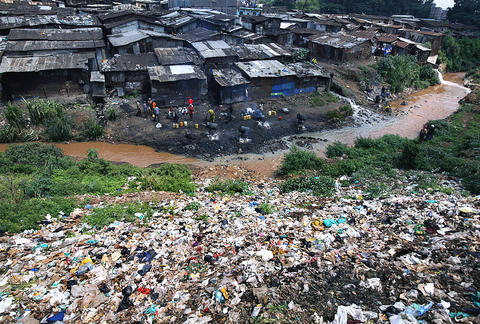These days Charity Bokindo, the district commissioner of Nairobi North, is taking no chances. Wherever she goes, she carries not one but two pistols, and she always travels with armed guards.
"The Mungiki," she whispered, "they threatened to circumcise me."
Kihara Mwangi, a member of Kenya's parliament, recently disclosed that he had been kidnapped by the Mungiki, a secret society that is part Sicilian Mafia, part Chicago street gang, with a little of the occult sprinkled in.

PHOTO: NY TIMES NEWS SERVICE
"These guys are devil worshipers," he said. "And no one knows what they want."
The Mungiki mystery is sweeping across Kenya, taking a lot of lives with it. In a month, more than 50 people have been killed in a crime spree and brutal police crackdown.
Police officials say the Mungiki aim to destabilize the country before the presidential elections in December and blame them for some downright ugly acts: chopping off legs, skinning heads and guzzling jugs of human blood. Government officials accuse them of running an extortion empire and hacking up victims.
The Mungiki Menace, as local papers call it, plays into many of Kenya's sore spots: tribal frictions, political shenanigans, poverty and crime. The flash point is Mathare, a giant slum and mountain of rust near Nairobi, the capital, where 500,000 people fill a warren of corrugated metal shanties.
On a recent afternoon, John Kinywa, 17, a passion fruit juice vendor, trolled his patch of Mathare, shaking a plastic bowl for donations for a friend's funeral.
"Just a shilling; can't you spare a shilling?" he asked passers-by, who, by the look of their ragged clothes and chopstick legs, probably could not.
Kinywa said police officers shot his friend, who he insisted was innocent, in a raid against the Mungiki early this month.
Mathare is one of countless slums in Kenya that the government does not quite reach. There are no police stations here, or fire hydrants or roads.
The Mungiki did not start here. They came from the Kikuyu tribal highlands north of Nairobi, that carpeted green, straight-off-a-postcard Out of Africa side of Kenya.
According to Hezekiah Ndura Waruinge, one of the Mungiki's founders, the group began as a local defense squad during land clashes in the late 1980s between forces loyal to the government, which was dominated by the Kalenjin tribe, and farmers who were Kikuyu, a rival tribe.
By the late 1990s, the Mungiki went urban, Waruinge explained, taking over the city's minibus trade.
Then they diversified into garbage collection, building materials and the protection racket.
But then the Mungiki made a mistake, Waruinge said, and dabbled in politics, supporting losing candidates in the elections of 2002 and falling on the wrong side of the government.

‘THEY KILLED HOPE’: Four presidential candidates were killed in the 1980s and 1990s, and Miguel Uribe’s mother died during a police raid to free her from Pablo Escobar Colombian presidential candidate Miguel Uribe has died two months after being shot at a campaign rally, his family said on Monday, as the attack rekindled fears of a return to the nation’s violent past. The 39-year-old conservative senator, a grandson of former Colombian president Julio Cesar Turbay (1978-1982), was shot in the head and leg on June 7 at a rally in the capital, Bogota, by a suspected 15-year-old hitman. Despite signs of progress in the past few weeks, his doctors on Saturday announced he had a new brain hemorrhage. “To break up a family is the most horrific act of violence that

HISTORIC: After the arrest of Kim Keon-hee on financial and political funding charges, the country has for the first time a former president and former first lady behind bars South Korean prosecutors yesterday raided the headquarters of the former party of jailed former South Korean president Yoon Suk-yeol to gather evidence in an election meddling case against his wife, a day after she was arrested on corruption and other charges. Former first lady Kim Keon-hee was arrested late on Tuesday on a range of charges including stock manipulation and corruption, prosecutors said. Her arrest came hours after the Seoul Central District Court reviewed prosecutors’ request for an arrest warrant against the 52-year-old. The court granted the warrant, citing the risk of tampering with evidence, after prosecutors submitted an 848-page opinion laying out

North Korean troops have started removing propaganda loudspeakers used to blare unsettling noises along the border, South Korea’s military said on Saturday, days after Seoul’s new administration dismantled ones on its side of the frontier. The two countries had already halted propaganda broadcasts along the demilitarized zone, Seoul’s military said in June after the election of South Korean President Lee Jae-myung, who is seeking to ease tensions with Pyongyang. The South Korean Ministry of National Defense on Monday last week said it had begun removing loudspeakers from its side of the border as “a practical measure aimed at helping ease

STAGNATION: Once a bastion of leftist politics, the Aymara stronghold of El Alto is showing signs of shifting right ahead of the presidential election A giant cruise ship dominates the skyline in the city of El Alto in landlocked Bolivia, a symbol of the transformation of an indigenous bastion keenly fought over in tomorrow’s presidential election. The “Titanic,” as the tallest building in the city is known, serves as the latest in a collection of uber-flamboyant neo-Andean “cholets” — a mix of chalet and “chola” or Indigenous woman — built by Bolivia’s Aymara bourgeoisie over the past two decades. Victor Choque Flores, a self-made 46-year-old businessman, forked out millions of US dollars for his “ship in a sea of bricks,” as he calls his futuristic 12-story